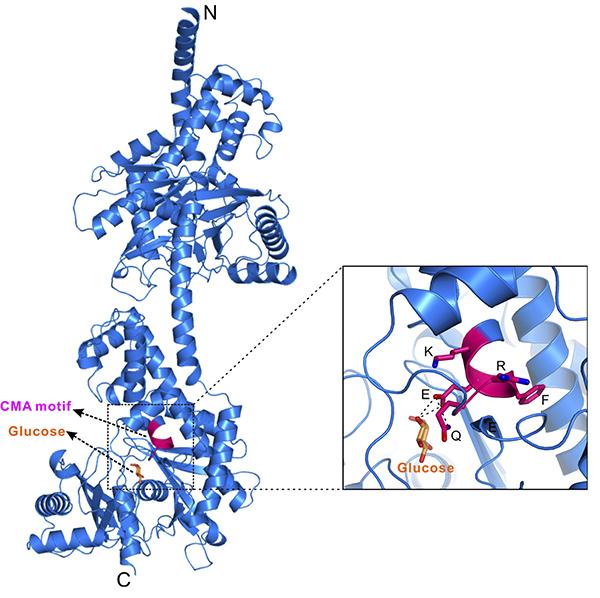
Eliminating HK2 (shown here), which is a key enzyme for glucose metabolism, may be a way to prevent cancer cells from surviving, A study published in The Journal of Cell Biology describes a way to force cancer cells to destroy a key metabolic enzyme they need to survive.
Cancer cells survive the stressful environment inside a tumor in part through autophagy, the controlled digestion and recycling of damaged components. However, blocking the process doesn't kill cancer cells, so researchers have been looking for a way to make cells vulnerable to autophagy shutdown.
Researchers at Harvard Medical School in Boston used an ovarian cancer cell line that is resistant to the autophagy inhibitor spautin-1 or an upgraded version of this molecule. After screening more than 8,200 compounds, they found that quizartinib was the most effective at enhancing the cells' vulnerability to either of the autophagy blockers. Quizartinib inhibits FLT3, an enzyme that is important for the normal development of hematopoietic stem cells and a validated target for acute myeloid leukemia (AML). The drug is currently in clinical trial for treatment of AML, but its value beyond has not been well explored.
The team found that quizartinib and the improved version of spautin-1 killed tumor cells from a variety of cell lines while leaving noncancerous cells unscathed. Treating cancer cells with quizartinib alone inhibited an important metabolic pathway, glycolysis, and activated macroautophagy, the best known type of autophagy in which the cell digests a large portion of its contents. In contrast, cells that received both compounds couldn't initiate macroautophagy, but they switched on chaperone-mediated autophagy, a selective form of the process that eliminates individual molecules.
One of its targets was the enzyme Hexokinase2 (HK2), which is crucial for glucose metabolism and is often overexpressed in cancer cells. By eliminating HK2, quizartinib and the autophagy inhibitor may prevent cancer cells from metabolizing absorbed glucose and mobilizing stored nutrients, thereby triggering cancer cell death. The study provides evidence that combining an FLT3 inhibitor with an autophagy blocker could be a new way to treat cancer.
Source: Rockefeller University Press
 Print Article
Print Article Mail to a Friend
Mail to a Friend
